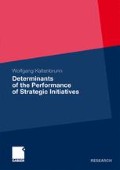Abstract
In line with strategy process research, this thesis uses a theoretical model which employs a process logic to explain the causal relationships between observed inputs (independent variables; i.e., the contextually induced degree of centralization of leadership, the degree of decision-making rationality, and the degree of organizational member involvement each within the division where the respective initiative has been developed) and with respect to the strategy content or outcomes (dependent variable; i.e., strategic initiative performance) in a variance theory (Van de Ven, 1992). According to our model, these relationships are moderated by the degree of exploration inherent in the initiative's task (i.e., moderating variable).
Access this chapter
Tax calculation will be finalised at checkout
Purchases are for personal use only
Preview
Unable to display preview. Download preview PDF.
Rights and permissions
Copyright information
© 2009 Gabler | GWV Fachverlage GmbH
About this chapter
Cite this chapter
Kaltenbrunn, W. (2009). Theoretical model and hypotheses. In: Determinants of the Performance of Strategic Initiatives. Gabler. https://doi.org/10.1007/978-3-8349-8326-8_3
Download citation
DOI: https://doi.org/10.1007/978-3-8349-8326-8_3
Publisher Name: Gabler
Print ISBN: 978-3-8349-1840-6
Online ISBN: 978-3-8349-8326-8
eBook Packages: Business and EconomicsBusiness and Management (R0)

